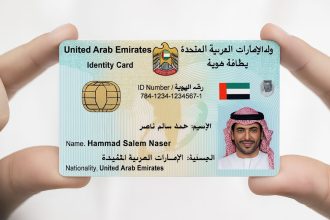Goodbye, Emirates ID! UAE New Facial Recognition and Biometrics Technology. The United Arab Emirates (UAE) is poised to revolutionize personal identification by replacing physical Emirates ID cards with a cutting-edge biometric digital identity system. This transformative initiative, spearheaded by the Federal Authority for Identity, Citizenship, Customs & Port Security (ICP), aims to enhance security, streamline services, and align with the nation’s digital-first strategy.
Embracing Biometric Innovation
The forthcoming system will utilize facial recognition and artificial intelligence (AI) technologies to authenticate individuals, eliminating the need for physical ID cards. Accessible through the ICP’s smart application, this digital identity will serve as a secure gateway to various services across the UAE.
Strategic Implementation Across Sectors
The biometric ID system is set to be integrated across multiple sectors, including:
- Government Services: Facilitating efficient access to public services.
- Banking and Finance: Enhancing security in financial transactions.
- Telecommunications: Simplifying customer verification processes.
- Healthcare: Ensuring accurate patient identification.
- Hospitality and Insurance: Streamlining check-in and claim procedures.
By adopting this technology, the UAE aims to bolster security measures and improve user experience across these critical sectors.
Phased Rollout and Future Vision
The transition to the biometric system will occur in carefully planned phases. Initially, simpler services will adopt the new technology, followed by more complex applications, ensuring a smooth and comprehensive shift toward a fully digital ecosystem.
This initiative is part of the UAE’s broader “Government Bureaucracy Elimination Plan,” launched in August 2024, which seeks to modernize public services and reduce administrative inefficiencies.
Enhancing Travel and Airport Experiences
The UAE airports are already experiencing the benefits of biometric technology. For instance, Abu Dhabi’s Zayed International Airport has implemented facial recognition systems at security checkpoints, allowing passengers to move through the airport swiftly without the need for physical documents.
Similarly, Dubai International Airport’s “Smart Tunnel” utilizes facial and iris recognition to expedite passport control, setting new standards for efficient and contactless travel.
Commitment to Data Security and Privacy
The ICP emphasizes that the biometric ID system adheres to strict national data protection laws and risk management protocols. By implementing high standards of technical and procedural verification, the UAE ensures that personal data remains secure and confidential throughout the identification process.
Conclusion
The UAE’s move to replace physical Emirates ID cards with a biometric digital identity system marks a significant milestone in the nation’s journey toward digital transformation. By leveraging advanced technologies like facial recognition and AI, the UAE is setting a precedent for secure, efficient, and user-friendly identification methods that could inspire similar initiatives worldwide.










